Many adults around the world believe that spells, curses or other magic can influence people’s lives. Survey respondents in sub-Saharan African countries and in Colombia are especially likely to hold this belief: Seven-in-ten or more adults in those places express belief in spells. But fewer than half of adults surveyed in Europe, North America, East Asia and Australia hold this view.
On the other hand, when it comes to trying to see the future – like consulting a fortune teller or horoscope – fewer than a quarter of adults in nearly all 35 countries surveyed say they engage in these practices. South Africa (47%) and India (45%) have the highest shares of adults who say they consult a fortune teller or horoscope to see the future.
The survey also finds that:
- Christians are much more likely than religiously unaffiliated adults to believe that spells and curses can affect people’s lives.
- Many Hindus, especially in India and Sri Lanka, consult fortune tellers or horoscopes to see the future.
- In many countries, those who pray daily are more likely than others to believe in spells and curses. By contrast, adults who pray at least daily are not particularly different from other adults when it comes to trying to see the future.
- Women are more likely than men to believe in the power of spells and to use a fortune teller or horoscope to see the future.
Jump to more on: Beliefs in spells, curses and magic | Consulting fortune tellers and horoscopes
Belief in spells, curses or other magic
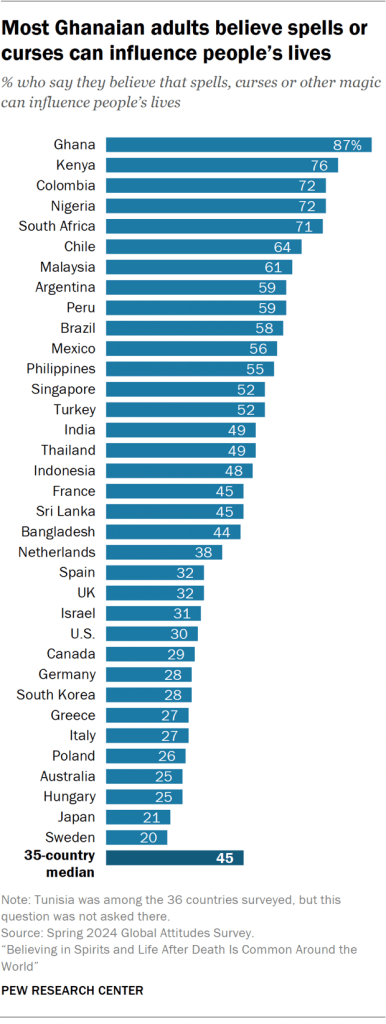
Across 35 countries surveyed, the share of adults who believe that spells, curses or other magic can influence people’s lives varies widely.
This belief is broadly held in all four African countries surveyed, by seven-in-ten or more adults in each place. Of all the countries surveyed, Ghana (87%) has the largest share of adults who believe in the power of spells or curses.
More than half of all adults in the Latin American countries included in the survey also express this belief – ranging from 72% in Colombia to 56% in Mexico.
Substantial shares of adults in South and Southeast Asia also say spells, curses or other magic can influence people’s lives.
However, in North America, Australia, East Asia and most of Europe, one-third or fewer of adults hold this view. In the United States, 30% believe spells, curses or other magic can influence people’s lives. In Sweden and Japan, about one-fifth do.
Views by religion
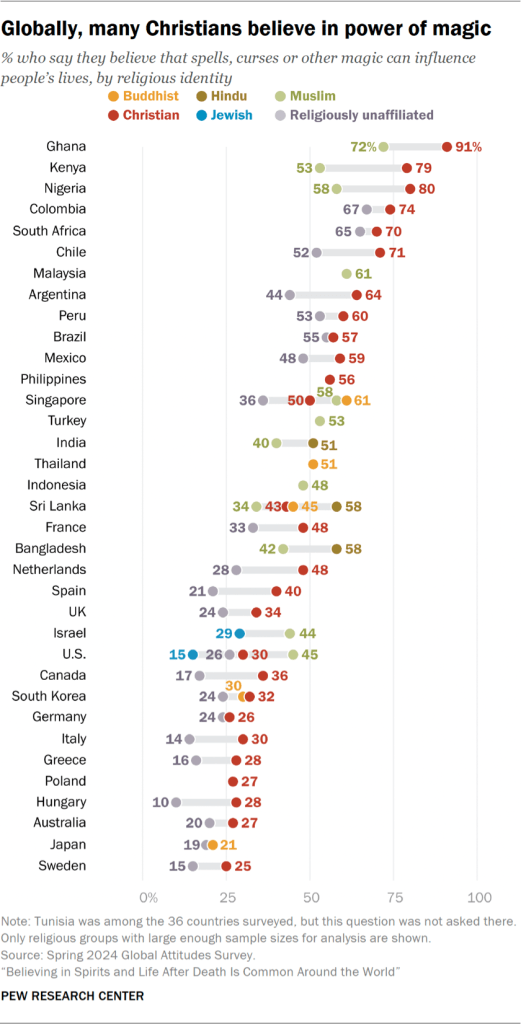
Christians generally are more likely than religiously unaffiliated adults to say they believe that spells, curses or other magic can influence people’s lives. In Singapore, for instance, 50% of Christians hold this belief, compared with 36% of unaffiliated adults.
Half or more of Hindus surveyed in Bangladesh (58%), Sri Lanka (58%) and India (51%) believe spells or curses can influence people’s lives.
Within religions, there are some geographic variations on this question.
For example, Israeli Jews are almost twice as likely as Jewish Americans to believe that spells, curses or other magic can influence people’s lives (29% vs. 15%). Among Buddhists, those living in South and Southeast Asia are more likely than those living in East Asia to express this belief.
Views by rate of prayer
Respondents who pray daily are more likely than those who pray less often to say they believe in spells, curses or other magic influencing people’s lives. This is particularly true in Europe. For instance, in Germany, 49% of adults who pray at least daily believe that spells, curses or other magic can influence people’s lives, while 24% of adults who pray less often take the same view.
In Ghana, however, the opposite is true: Adults who pray daily are slightly less likely than others to hold this belief (85% vs. 93%).
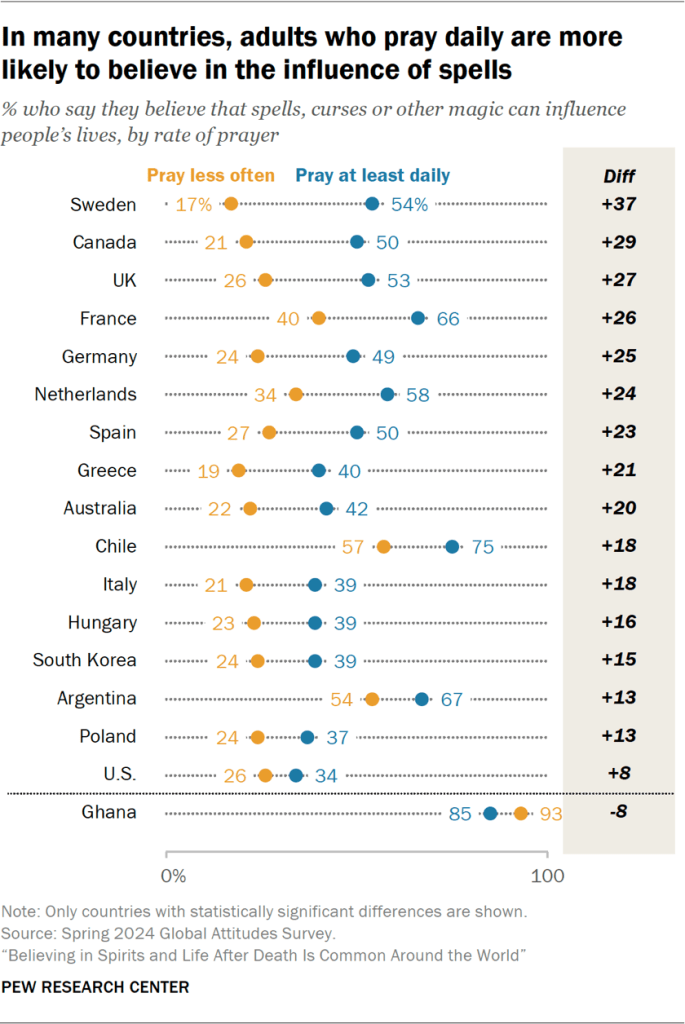
Consulting a fortune teller or horoscope to see the future
In most countries surveyed, fewer than a quarter of adults say they consult a fortune teller, horoscope or other way to see the future.
In Europe, this ranges from 17% of Hungarians to just 4% of Greeks. In the Americas, it ranges from 16% in Peru to 9% in the U.S.
India and South Africa stand out from the other countries surveyed, with 47% of South Africans and 45% of Indians saying they use such methods to try to see the future.
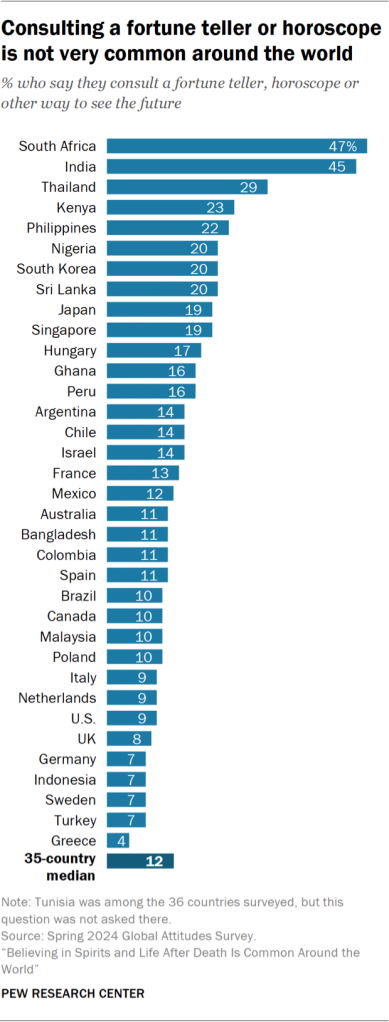
Views by religion
Hindus are among the most likely to consult a fortune teller or horoscope to see the future, including half or more in India and Sri Lanka (51% and 56%, respectively). In Bangladesh, 36% of Hindus also engage in these practices – far more than the share of Bangladeshi Muslims who do so (9%).
While around a third of Buddhists in Singapore, South Korea and Thailand use fortune tellers or horoscopes to see the future, just 16% of Buddhists in Sri Lanka and Japan do so.
In general, similar shares of Christians and the religiously unaffiliated in each country use fortune tellers or other ways to see the future. For instance, 10% of both Christians and unaffiliated adults in Australia say they engage in these practices.
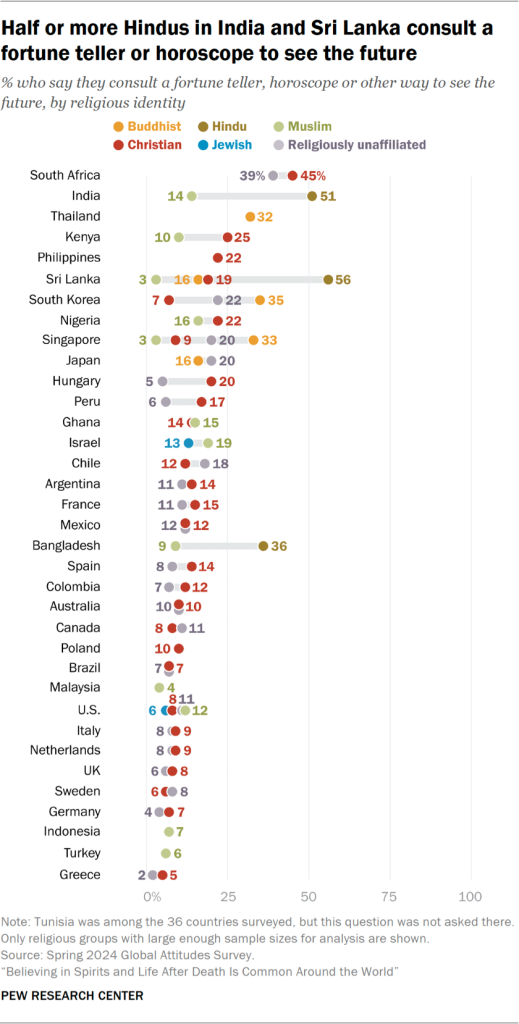
Views by gender
In most countries surveyed – including nearly every European country – women are more likely than men to use a fortune teller, horoscope or other way to see the future. For instance, in Poland, 16% of women do this, while just 2% of men say the same.
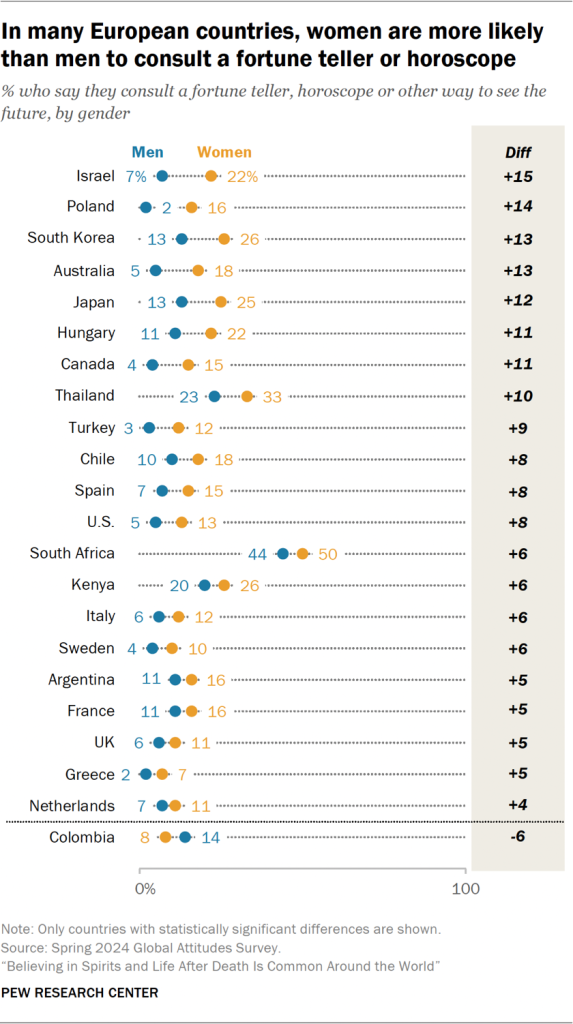
And in Japan, 25% of women use methods to see the future, compared with 13% of men.
However, the pattern is reversed in Colombia: Men are slightly more likely than women to consult fortune tellers and horoscopes to see their futures (14% vs. 8%).




